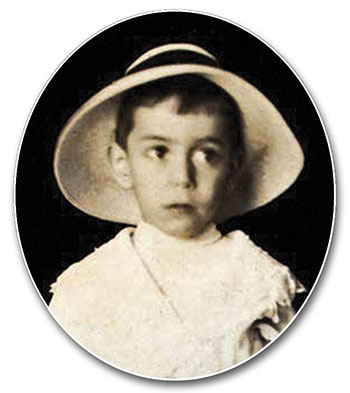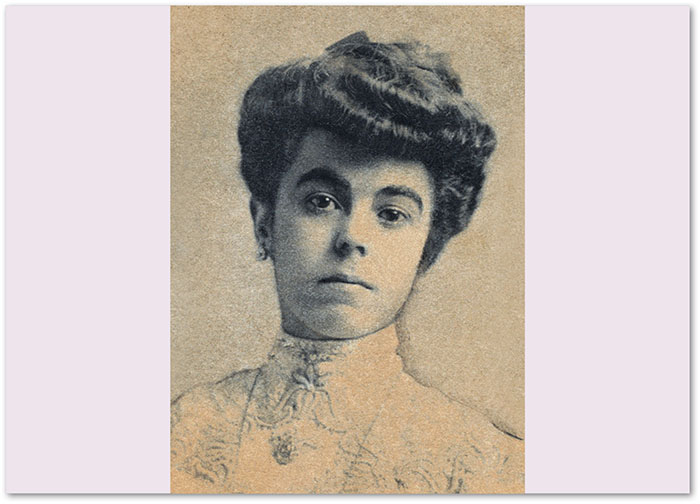Dona Lucilia’s company was an oasis for Plinio. From her, he learned, besides elevation, the giving of oneself taken to its ultimate consequences. The following comment is indicative of what an extraordinary aid she was to him, without which he would not have attained to the practice of virtue:
“One unfathomable benefit which I received from her, and I do not know what would have become of me had I not received it – though naturally Our Lady is my Mother and She would have provided for me – was to believe, through knowing her, that the degree of love and dedication which she possessed was possible. This, along with the degree of detachment of soul and the desire to apply herself to higher things, which characterized her.
“Whoever has known these two qualities tends to elevate his soul ad maiora, and acquires the conviction that, by truly loving Our Lord Jesus Christ and Our Lady, one becomes capable of a dedication and love such as hers. Nothing is more cynical than to imagine the world to be irremediably made up of egoists. However, if the soul comes to believe in the error that this is inescapable, life takes on a pall of bitterness, of disenchantment and of non-sens, of an unspeakable brutality…”
An incident involving Dona Lucilia aptly demonstrates, by the effect it produced in the soul of young Plinio, the degree of influence she had over her son. When he was seven or eight years of age, this event with its dolorous cast constituted a veritable mountain in his “childhood topography”.
Dona Lucilia suffers an accident
Plinio was at home, playing or contemplating, when suddenly the upsetting news began to spread that Dona Lucilia had suffered an accident while out of the house.
In brief, she had been at a dentist on São Bento Street, in the same building where her husband Dr. João Paulo’s office was located; descending a staircase, she had lost her balance, and reaching out to grasp the banister, had dislocated her shoulder.
Plinio suffered a terrible shock when he was told, in hushed tones, that she would be arriving under the effect of chloroform, which left a person somewhat anesthetized, because the resetting of a shoulder was an extremely painful procedure. For this reason, she would also be brought in an ambulance. In an era in which horses were still much used, one can well imagine how alarming it would be, to an innocent child, to see her conveyed in such a strange vehicle.
Then the family members left him to himself and began bustling about, making preparations and readying her room, all in great haste.
Finally, Dona Lucilia arrived.
He heard the commotion of the ambulance and, at a certain distance, the steps of those carrying her through the hallway. Then he saw the doctors, with those great mustaches from the time of the Kaiser, asking for plaster and hot water… All of this imparted an air of tragedy!

Dr. Plinio in his early childhood
Order and sweetness in the midst of suffering
At last Plinio was permitted to visit her. He would forever remember this contact with Dona Lucilia. He had been cautioned to embrace her very gently, and not to throw himself upon her, for she was still unwell and was in unbearable pain.
Ushered into the room in silence, he observed her from the doorway: she was lying in bed upon her right arm, with the other in a cast, her head resting on the pillow, very pale but steeped in resignation. There was a small blue lamp on the bedside table, and he could hear her moaning, so softly and in such a measured way that it was like the beating of a heart. And he thought: “What composure and what sweetness!”
When, in the dim bluish light, she perceived her son’s presence, she extended her arm and to him and beckoned:
“Filhão [big son], is it you?”
He approached the bed and kissed her face many times, while she embraced and caressed him. Then, before he could ask her anything about herself, she took the initiative and inquired:
“My son, is your cold better? Are you staying out of drafts and avoiding chilled drinks?”
Plinio then realized that even amid such pain, his mother still had the equanimity to be more concerned with his state of health than with her own situation. It was, therefore, a selfless affection, devoid of egoism, based only on love of God!
The sublime way of being treated remained engraved in Plinio’s soul and, as he withdrew, he thought: “There exists between her and me a profound interpenetration! My soul has the most intimate union and affinity with hers! Whatever affects her affects me, because I am an extension of her; whatever strikes there, hurts both there and here, because I feel as if she were inside me!”
Maternal quality that opened the way for devotion to Our Lady
It can be seen in all these episodes of his early childhood that she was created to be for her son a kind of stepping-stone by which for him to reach God and, at the same time, a support for him to more easily understand devotion to Our Lady later on. She was like the hem of Our Lady’s mantle, which came within the boy’s reach. As such, when during a difficult period in his life at the age of twelve he knelt at the feet of the statue of Our Lady Help of Christians, saying: “Save me, O Queen, Mother of mercy!”, that complete confidence had as its basis his love and understanding of Dona Lucilia’s maternalism: “If my mother is the way she is, then I cannot even imagine how She who is the Mother of mothers, the Mother of all humanity, must be!”
“The fact of having sensed this patience of my mother prepared the way for something far greater: devotion to Our Lady. And when I pray the Salve Regina or the Memorare, I have the impression of acting towards Her somewhat as I acted towards Mama. Not in the physical sense of the word, but saying things to Her which open her mercy […], knowing that the entreaty of the afflicted son is heard, and that I can tell her my problems with confidence, for I am never badly received. In one way or another, in the days following these events, I began to compare my mother with the other older people I saw, and I thought: ‘There is no one else like her. If I am good, she will be for me a sea of goodness! But does this goodness come from her? No! I can see that it exists, in flashes, in other people as well, but in her, it remains as a constant. If it exists in several, the source of the goodness cannot be in her. So I need to discover it!’ And a certain vague idea came to me that Mama was but a drop of water in an ocean… Later, I would understand that the source was Our Lord Jesus Christ.”1 ◊
Taken, with slight adaptations, from:
O dom de sabedoria na mente, vida e obra
[The Gift of Wisdom in the Mind, Life and Work of]
Plinio Corrêa de Oliveira. Città del Vaticano-São Paulo: LEV;
Lumen Sapientiæ, 2016, v.I, p.126-130
Notes
1 CORRÊA DE OLIVEIRA, Plinio. Notas Autobiográficas [Autobiographical Notes]. São Paulo: Retornarei, 2008, v.I, p.71.

